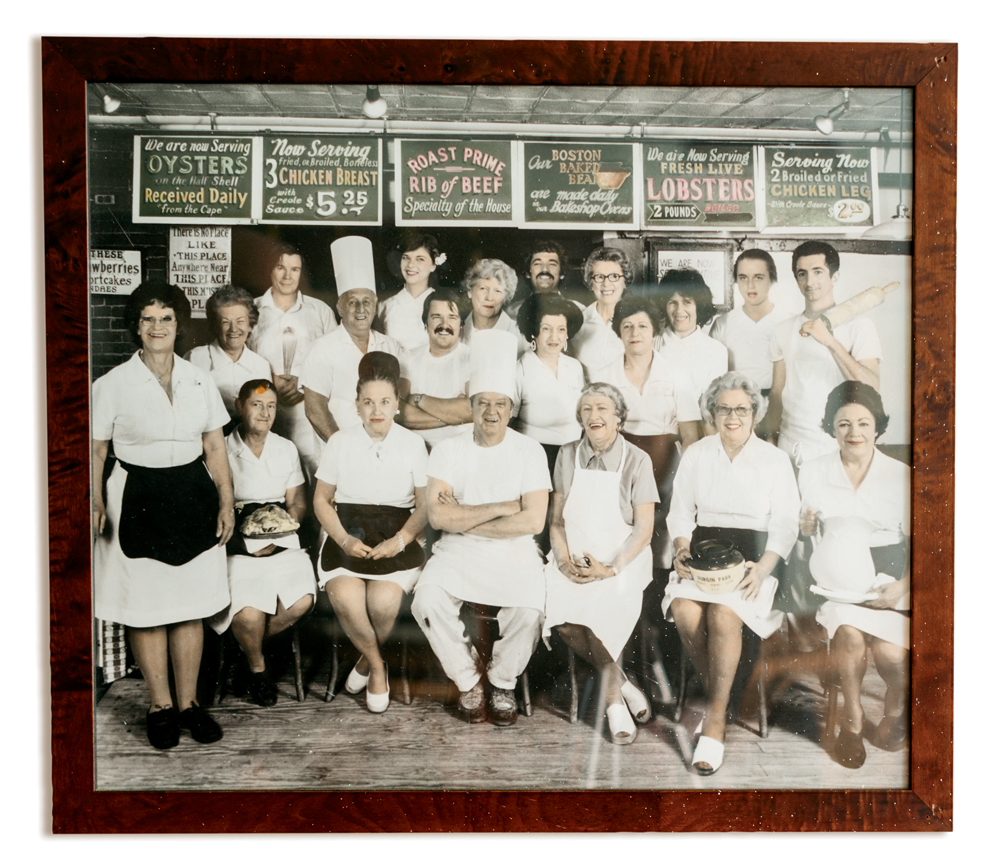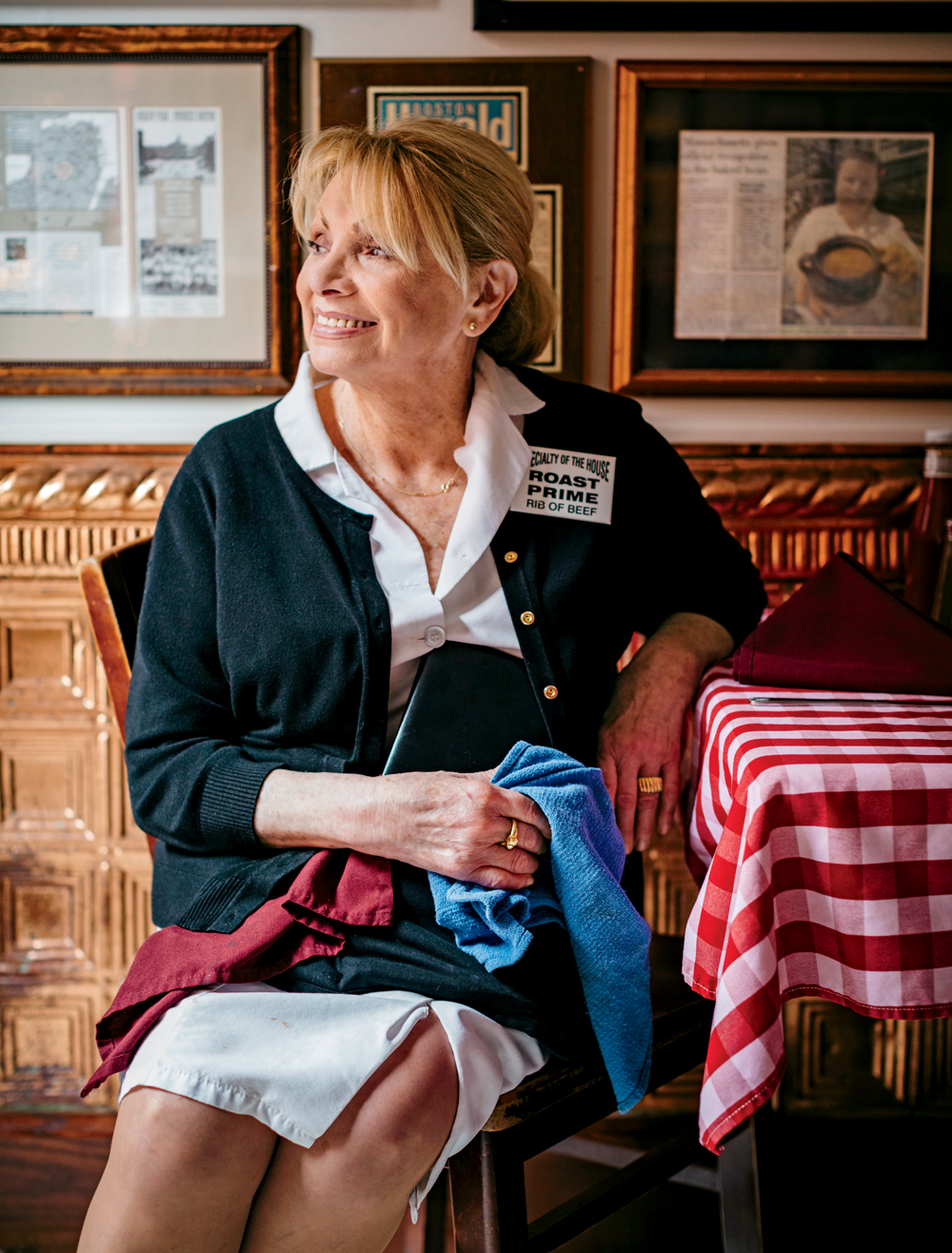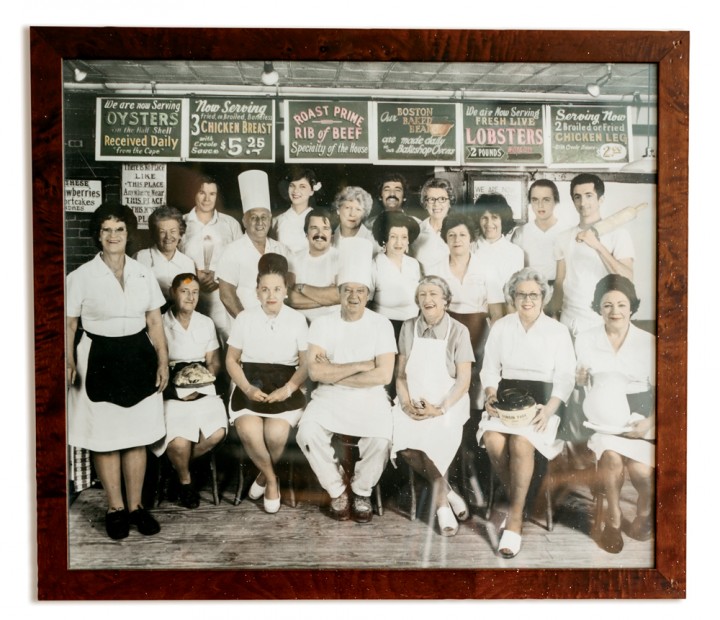Durgin–Park | New England’s Gifts
At Boston’s Durgin–Park, you take a seat in the restaurant’s original North Market location (today part of Faneuil Hall Marketplace) and enjoy the same kind of meal—pot roast, baked beans, Indian pudding—that diners did when the place first opened in 1827. You may even experience the same sometimes-bawdy, often-sarcastic service that has made Durgin–Park a […]

Durgin–Park staff, 1985.
Photo Credit : Michael Piazza, courtesy of Durgin-Park
Photo Credit : Michael Piazza
“When the restaurant opened it catered to the people who worked overnight at the Faneuil Hall market—the longshoremen, the produce people, the meat men. They worked all night, so when they got off and came into the restaurant, they were usually grumpy and would give the service staff a hard time. The staff finally had enough of it and started giving it back, and it stuck. Then people started coming here for the abuse. But it’s toned down over the years. It had to. People don’t understand the history of the fooling around, or they’re offended by it, and it’s not supposed to offend anybody.”
—
“The late Dottie Lamb was Durgin–Park. She worked here 48 years. She chewed gum and swore like a truck driver. That was her claim to fame. But she was the most popular one here. Some nights customers wanted only her tables. If someone said, ‘You didn’t pour me a glass of water,’ she’d say, ‘Either pour it yourself or pray for rain. That’s the only way you’re going to get it.’ One of her regulars was this guy who was a real gentle giant. Big guy, maybe 300 pounds. He loved Dottie and loved the abuse. He was very involved in the Mormon church and would bring in the Mormon missionaries for a meal. When it was over he’d ask if his friends could sample the Indian pudding. Then he’d ask for one for himself. She’d look at him and say, ‘Your ass takes up two chairs as it is; I’m not bringing you the pudding.’ And she wouldn’t.”

Photo Credit : Michael Piazza, courtesy of Durgin-Park
“People don’t eat like they used to. You see that with how much red meat people want. Years ago we served only the ‘Durgin Prime Rib.’ That’s 32 ounces on the bone. About five or six years ago, we incorporated the ‘Yankee Cut’; that’s 16 ounces. Now we have the 10-ounce ‘Boston Cut.’ There are also more allergies now. In my day you could eat a ketchup bottle and nothing would happen to you. Now they’re allergic to carrots, air, water. ‘Is water gluten-free?’ I was asked that the other night. Really? Get that silver bullet and shoot me now. I walked away.”
—
“I couldn’t work anywhere else. None of us could. They wouldn’t hire us. They wouldn’t give us an application. I know people who have left here for another job and lasted only a couple of weeks. Just couldn’t do it. It’s like one big dysfunctional family here. But it’s a happy family. We watch out for each other.”
—
“When it comes to the tips, it’s like that saying: Some days chicken, some days feathers. You can’t let it bother you. I know some people will let a bad tip ruin their day, but you can’t do that. There’s always another table. I find that if you really enjoy guests, it will reflect. They can tell. They can tell whether it’s phony or an effort to be nice.”
—
“I’m 73 now and I won’t lie: I’m not who I was. I can feel the difference. It’s my endurance. I still work the 10-hour days. But can I lift the plates I used to? No. Can I lift a tray of potatoes without pain? No. I used to be hot stuff when I was young. Now they call me Abuelita. That’s ‘grandmother’ in Spanish. How did that happen? I’ve gone from high heels to skidproof shoes. But that’s okay. As soon as I walk through the door, I feel myself becoming the person who works here. I come in, turn on Barry White, and that’s how I start my day. It always starts with Barry. I love his music. It brings me back to the older days. When I was alive.”
Have you ever been to Durgin-Park? Share your memories!
Ian Aldrich
Ian Aldrich is the Senior Features Editor at Yankee magazine, where he has worked for more for nearly two decades. As the magazine’s staff feature writer, he writes stories that delve deep into issues facing communities throughout New England. In 2019 he received gold in the reporting category at the annual City-Regional Magazine conference for his story on New England’s opioid crisis. Ian’s work has been recognized by both the Best American Sports and Best American Travel Writing anthologies. He lives with his family in Dublin, New Hampshire.
More by Ian Aldrich

